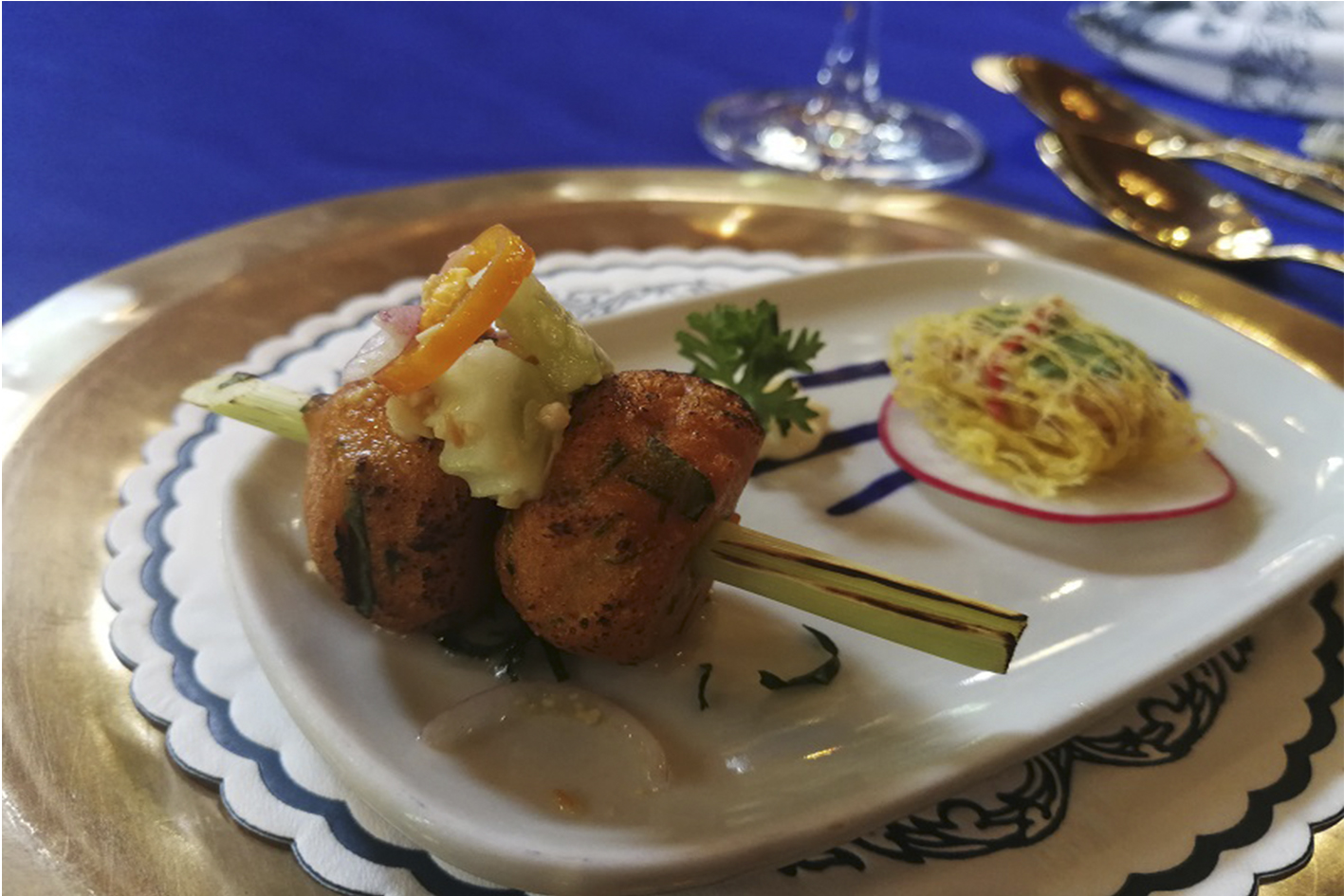
26 Sep Blue Elephant: French twists on Thai fare that never miss
COCONUTS OF BANGKOK | By Laurel Tuohy
THOUGH IT’S HARDLY new, this classic Thai staple — housed in a perfectly preserved century-old house — is always packed due to its extensive menu of never-miss Thai dishes with European twists.
Whether you visit their iconic Sathorn Road location with colleagues for a lunch sets, bring your parents when they come to town, or propose there (Seriously, the famed restaurant is the site of many marriage proposals each month); you’ll never leave disappointed from this big name on Bangkok’s Thai food scene.
We recently had the chance to sample some of their showstoppers, many of which appear on their regular menu and some which appear seasonally, or on special menus. Though the photos show sampler portions, the prices listed are for full-sized dishes.
As amuse-bouche, we began with jeangron (occasional menu item), an ancient recipe from Nonthaburi province. The Blue Elephant interpretation features clown featherback prepared with red curry paste, kaffir lime leaves, and basil leaves, accompanied by cucumber and peanut salad. Alongside it, we received a sampling of lateang (occasional menu item), a dish from the period of King Rama II that stars wild blue swimmer crab wrapped in an elegant nest of egg.
For appetizers, we were presented with a plate of crispy crab souffle (THB340) featuring prawns, chicken, and crab with sweet chili sauce; chicken satay (THB240) with strips of tender KamphaengSaen beef alongside the traditional poultry; and lychee duck salad (this is an occasional menu item, the similar tangerine duck salad is THB520) made up of thick wedges of rich duck dressed in tangerine, lime, tamarind, and sweetened with palm sugar.
The vegetarians in the group started with tofu salad (THB320) accompanied by Royal Project vegetables and dressed in white sesame; doikham eggplant salad (THB380), in which the grilled nightshade was treated with with herbs, spices, and a hint of truffle; and steamed Thai dumplings (THB320) made with pandan leaves and stuffed with taro, yam, and black mushroom. The dumplings perfectly tempered salty with sweet, thanks to the taro.
The main courses didn’t disappoint either and focused mainly on extremely fresh ingredients. On the menu were crispy sea bass with fresh mango salad (this is an occasional menu item, the similar whole sea bass in chili-lime dressing is THB780), a very traditional Thai dish elegantly rendered, stir-fried fresh prawns (occasional menu item) seasoned with fresh lemongrass, black pepper and finished with truffle oil, and founding Chef NoororSomany Steppe’s signature lamb massaman (THB680) with purple sweet potato replacing the traditional white or yellow potato, providing an extra rich element to an already multifaceted dish.
Non-meat eaters were not forgotten in the food revelry either. They enjoyed a vegetarian green curry with ginger, kaffir lime leaves, and bird’s eye chili (THB420), fresh tofu with three-flavored sauce of chilies, soy, and pineapple (THB320), and stir-fried purple aubergine with holy basil on a bed of garden vegetables (THB420).
Clockwise, from top: Pad Thai, three-seasoned tofu, stir-fried aubergines, green curry.
Of course, no Thai meal is complete without the country’s omnipresent Pad Thai (THB320). The Blue Elephant meat-free version we tried left us rubbing our tummies when we couldn’t stop eating it.
It’s hard to find more convivial service or better atmosphere than Blue Elephant, which is always known for excellent dishes. If you haven’t been in a while, it might be time to check it out again. If you need to save up a bit for the experience, you can try their line of curry pastes, sauces, mixes, and condiments at grocery stores around the city.
FIND IT:
Blue Elephant Restaurant and Cooking School
233 South Sathorn Road
BTS Surasak



